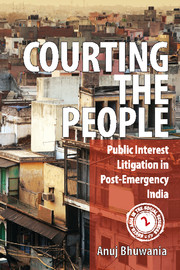Book contents
- Frontmatter
- Contents
- Acknowledgements
- Introduction
- 1 Competing Populisms: Revisiting the Origins of Public Interest Litigation in India
- 2 The Case that Felled a City: A PIL with Nine Lives
- 3 Public Interest Litigation as a Slum Demolition Machine
- 4 Good Judges, Bad Judges: Critical Discourses on Public Interest Litigation in India
- Conclusion: The Procedural is Political
- Bibliography
- Index
2 - The Case that Felled a City: A PIL with Nine Lives
Published online by Cambridge University Press: 23 July 2017
- Frontmatter
- Contents
- Acknowledgements
- Introduction
- 1 Competing Populisms: Revisiting the Origins of Public Interest Litigation in India
- 2 The Case that Felled a City: A PIL with Nine Lives
- 3 Public Interest Litigation as a Slum Demolition Machine
- 4 Good Judges, Bad Judges: Critical Discourses on Public Interest Litigation in India
- Conclusion: The Procedural is Political
- Bibliography
- Index
Summary
The new role of the Supreme Court is that of a policymaker, lawmaker, public educator and super administrator all rolled in one. In the US, they have the Congress, the Federal Environment Protection Agency and bags of money to protect the natural environment. Here, we have our Supreme Court.
–Shyam DivanIn Delhi, in 2000, so much of the government's activity in so many matters boiled down to securing compliance of court orders in PIL that one might have been excused for thinking of it as the court's bailiff.
–Gita Dewan VermaIn 1984–85 a lawyer named M. C. Mehta filed a bunch of Public Interest Litigation (PIL) cases in the Supreme Court of India. These cases were fated to be landmarks in the history of PIL in India. They are generally discussed as the archetypical environmental PILs, which set the pace of judicial intervention in urban governance and environmental regulation in India. In narrating the story of PIL, these cases are usually read as signalling a new era, shifting the focus of PIL away from the dominant concerns of poverty and judicial reform to the subject of environment. My focus in this chapter, however, will be on the pioneering innovations introduced in these PIL cases. These cases have been trailblazers in exploring the boundless potentialities of PIL in India, particularly in Delhi. I will foreground these trendsetting procedural novelties and the politics immanent in them. The shifts that these cases brought about in PIL were not only in terms of its ideological concerns, but also in terms of the very nature of its process. This is the story I shall try to narrate here.
Four of these M. C. Mehta PILs from 1984–85 are still going on after three decades, with no end in sight. The unending nature of these cases provides us a hint as to their unique nature. These four vintage PILs still thriving are the cases popularly known as the Taj Mahal Pollution case, the Ganga Pollution case, the Delhi Vehicular Pollution case and the particular case that I will be focusing on here, Writ Petition (Civil) 4677/1985. No such simple moniker would work for the latter case as its very cause of action, i.e. its central dispute shifted, not once, but multiple times in the last three decades.
- Type
- Chapter
- Information
- Courting the PeoplePublic Interest Litigation in Post-Emergency India, pp. 50 - 79Publisher: Cambridge University PressPrint publication year: 2016



